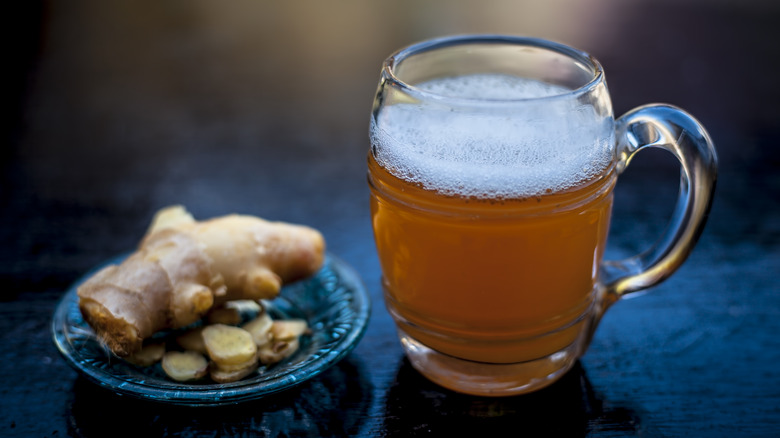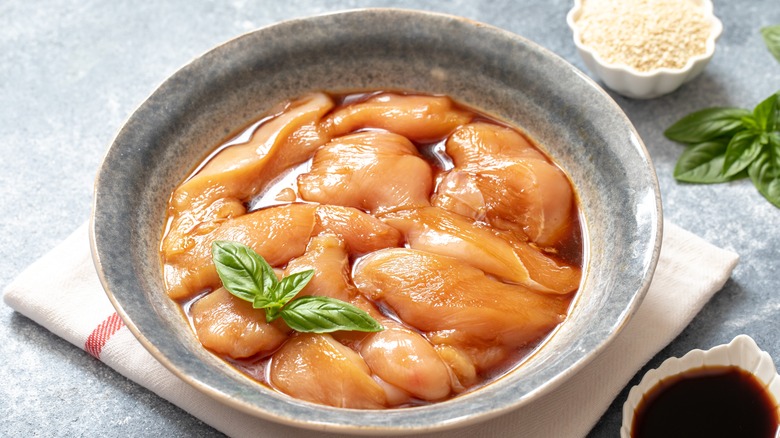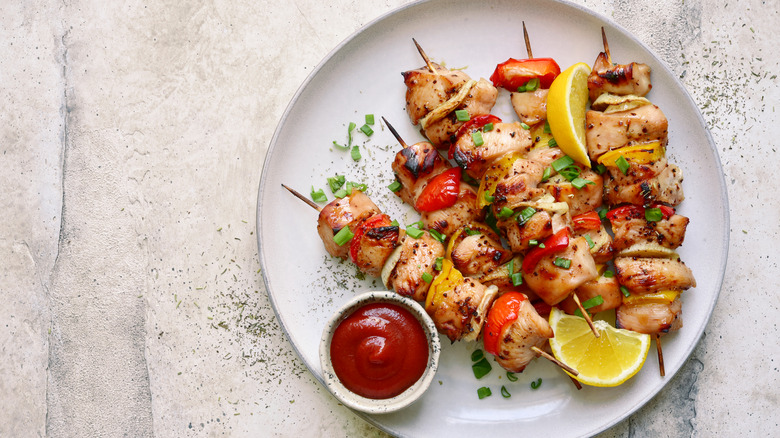Start Adding Ginger Beer To Your Meat Marinades And Thank Us Later
If you want highly flavored, tender, juicy meat, it might be time to mix some ginger beer into something besides your Moscow mule. Adding ginger beer to your marinade not only adds a punchy ginger flavor, but it adds sugar, acid, and carbonation. The fermented ginger is a flavor blast — that much you knew already. The sugar will help the meat brown, accelerating the Maillard reaction and giving you a deliciously savory exterior. The acid and carbonation, on the other hand, help tenderize and improve the experience of the cooked meat.
A study published in the Nigerian Journal of Animal Production found that of lime juice, pawpaw leaf extract, and carbonated drink marinades, the carbonated drink marinade resulted in the best piece of beef. It had the "best overall acceptability concerning sensory test[s]," the best color — even though the carbonated drink was colorless — and the least loss of moisture in refrigeration and cooking.
Depending on your marinade, you can use either ginger beer or ginger ale. Generally speaking, ginger beer will have a stronger, spicier ginger flavor and lighter sweetness — while a ginger ale will have a milder, sweeter flavor. They'll both have similar pH levels, hovering between three and three and a half, so it really comes down to what kind of flavor profile you want to achieve: Ginger beer? Stronger taste thanks to real ginger. Ginger ale? Milder taste thanks to ginger syrup.
Why does acid matter?
You may have noticed that many marinades have, at their base (no pun intended), an acid. That may be citrus juice, tomato juice, yogurt, or buttermilk. It's not just because it tastes delicious; there's a practical reason for it that cultures have picked up on over centuries. The acid is what makes it work.
A study in the 2010 issue of Meat Science showed that marinades with a lower pH — higher acidity — had a higher absorption during marinating. Acidic marinades have been proven to cause swelling of meat fibers, which tenderizes and flavors the meat, and various studies have shown that they can actually lower the temperatures at which gelatinization of collagen occurs, making the meat seem juicier. The study notes that the length of time meat is left to marinate vastly improves absorption rates as well.
Adding ginger beer to your marinade, with its acidic pH of three-ish, lowers the overall pH of your marinade. The study found that a marinade pH between 3.8 and 4.2 was most effective in absorption. Adding other things to it like oil or water will raise the pH, but adding additional acids will help bring it back down.
Mixing ginger beer into your marinades
When you're thinking about marinating your meat with ginger beer, consider flavors that already pair well with ginger. Ginger and citrus juice, for example, are easy to build off of. Ginger beer and lime could be paired with cilantro or lemongrass for a Thai, Vietnamese, or Mexican dish. Ginger beer and orange could use a touch of allspice or chili for a Chinese dish. Ginger beer and lemon could be mixed with rosemary and thyme for something a little more Mediterranean.
But you can branch out from there by combining ginger beer with elements like apple cider or apple cider vinegar, a particularly delicious combination for pork. Or you could mix it with balsamic vinegar and sage to play up the warm woodiness of it. You could cut it with tropical juices like pineapple, mango, or passionfruit. Amp it up with jerk spices for a different take on its warm woodiness.
You can take your cue from sticky ginger garlic wings, mixing ginger beer with garlic, soy sauce, and a bit of maple syrup. Pop it into a marinade for whiskey ginger salmon. Experimentation with flavors you already know by playing a mental association game can help you turn ginger beer into your new favorite marinade.


